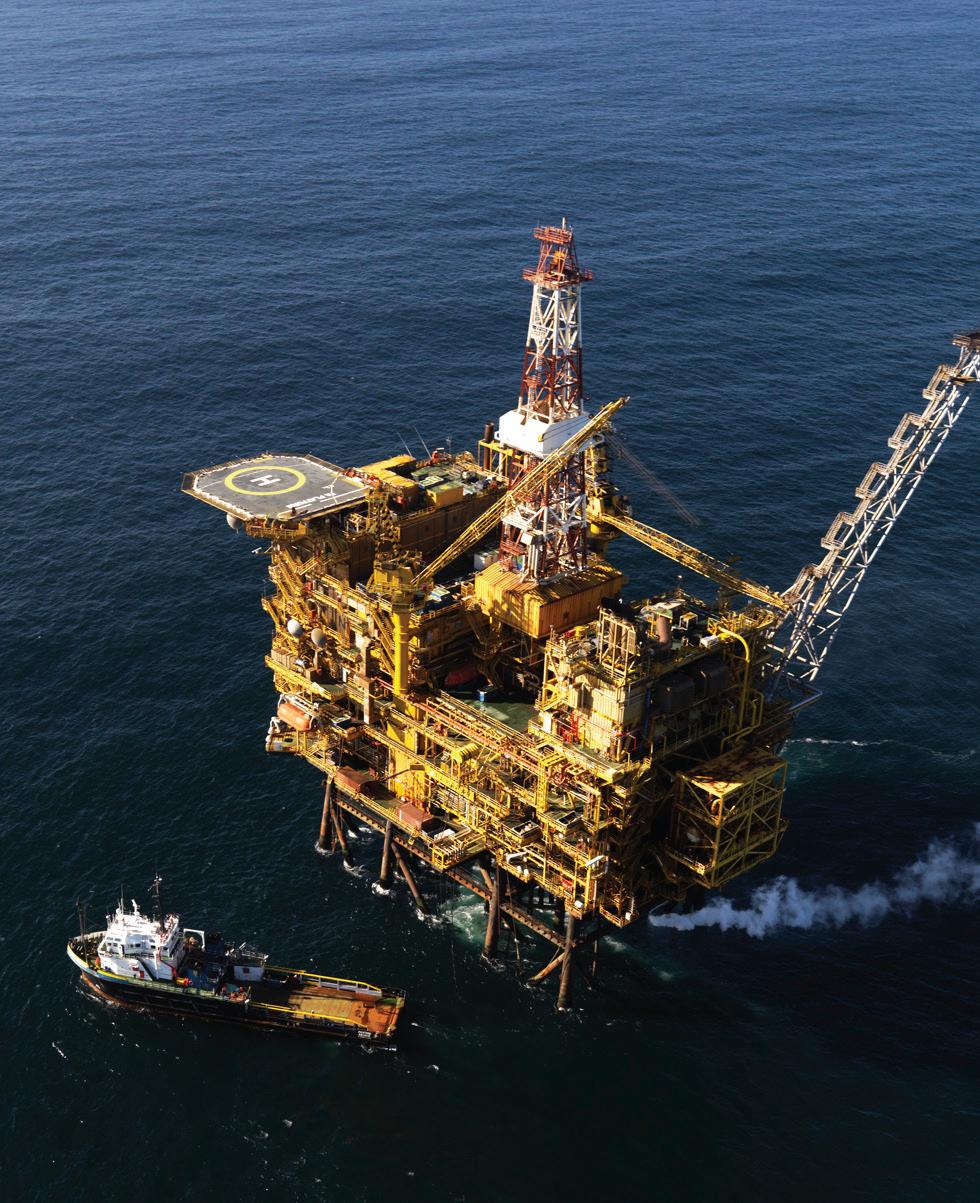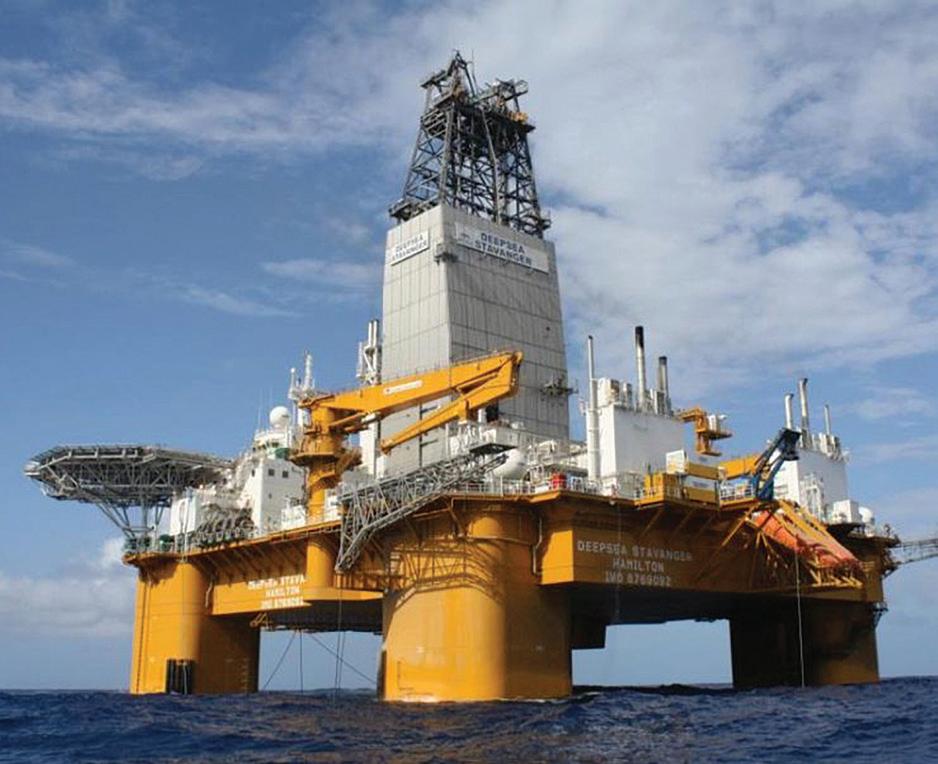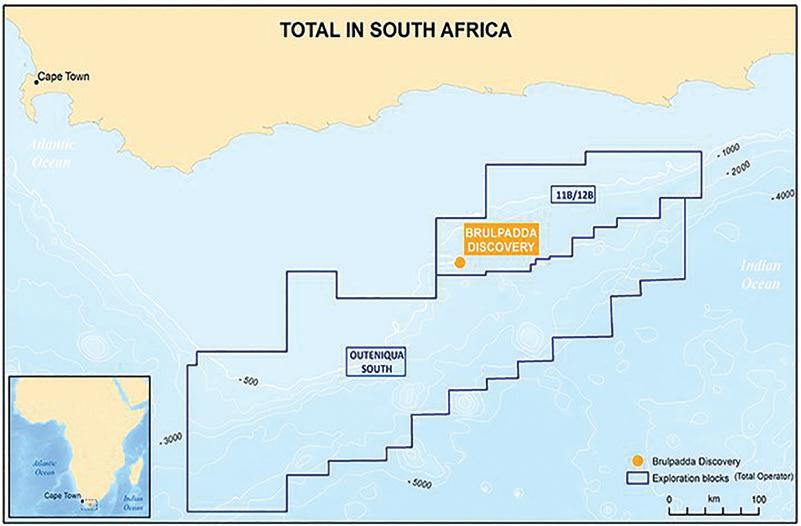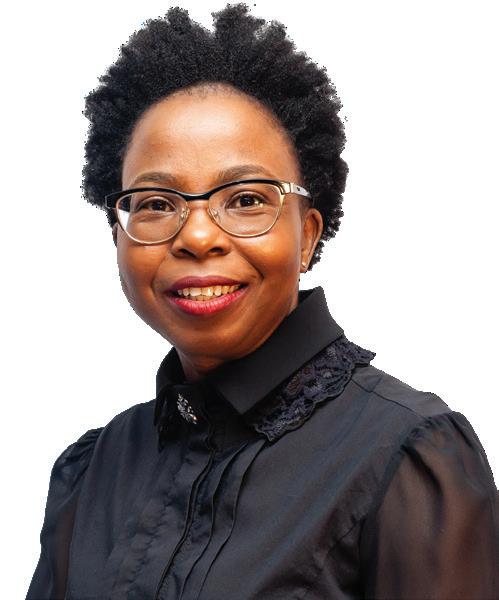
9 minute read
Oil and gas
Gas finds off the Southern Cape coast have vast potential.
In 2019 Total and its partners created a stir with the announcement that gas condensate had been found at a site called Brulpadda off the coast of Mossel Bay. In 2020, the nearby Luiperd prospect in Block 11B/12B delivered more exciting news.
Advertisement
The block, in the Outeniqua Basin 175km off the southern coast, covers an area of about 19 000km² in water depths of 200-1 800m. The exploration was done by the semi-submersible rig Deepsea Stavanger, which journeyed twice from Norway to lead the exploration projects.
The two finds raise the odds of Total investing in what it calls a
“world-class” offshore gas site. The drilling campaign employed 195 South Africans with specialist skills but the potential spinoff is enormous for the Western Cape and South Africa, if the find leads to drilling and commercialisation.
If Total goes ahead, the PetroSA GTL refinery at Mossel Bay (Mossgas) could be revived and the idea of creating a gas market in South Africa would get a massive boost. Commissioned in 1992 as the world’s first gas-to-liquids (GTL) refinery, Mossgas was due to close in 2020, because, as President Ramaphosa announced, it had practically run out of feedstock. PetroSA is South Africa’s national oil company.
Petroleum Agency South Africa (PASA), which encourages exploration and regulates the oil and gas industry, has noted the significance of international oil companies committing to exploration off South Africa’s coast. Increased confidence by such companies can only lead to growth in the industry, and with the massive gas finds in the Rovuma Basin off Mozambique in 2020, there are sure to be more companies interested in South Africa’s potential. In addition to adjudicating on coastal fields,
SECTOR INSIGHT The Chevron refinery produces petrol, diesel, jet fuel and liquefied gas.
the agency has awarded coalbed-methane-gas exploration rights in KwaZulu-Natal and natural gas exploration permits in the Free State.
Natural gas lies also lies offshore to the west of South Africa in the Atlantic Ocean (Ibhubesi). Block 2A of the Ibhubesi gas field north-west of Saldanha is estimated to have reserves of 850-billion cubic feet of gas.
Industrial gas manufacturing in the Western Cape is a particular focus for Air Products, a part of the Metkor Group controlled by Remgro. The company is one of the largest supplier in the pipeline and on-site markets.
The Western Cape’s status as an oil and gas hub was enhanced in 2017 with the opening of a new open-access liquefied petroleum gas (LPG) import and storage terminal at Saldanha Bay. A publicprivate partnership is behind the R1-billion terminal, the largest of its kind in Africa. Investors include Sunrise Energy, the Industrial Development Corporation (IDC), the Public Investment Corporation (PIC) and Royal Bafokeng Holdings.
Oil
Cape Town’s oil refinery changed hands in 2018 when Off The Shelf Investments (OTS) completed a $973-million purchase of Chevron’s downstream assets in South Africa. Chevron has been rebranded as Astron, but the Caltex service-station brand has been retained. OTS is the Black Economic Empowerment (BEE) partner of mining giant Glencore, who financed the deal.
The refinery in Milnerton produces petrol, diesel, jet fuel and liquefied gas for the Western Cape and for export to other African countries. The Western Cape spends R76-billion annually on crude oil imports and exports refined petroleum to the value of R13.2-billion.
Large quantities of oil are transported around the Cape of Good Hope every year: 32.2% of West Africa’s oil and 23.7% of oil emanating from the Middle East. Reduced global prices for oil and troubles in the container ship market has caused some stress in the local sector but the long-term prospects for shipping and oil and gas are still strong enough for national government to pursue Operation Phakisa (which includes a strong maritime economy push) and for the Transnet National Ports Authority to spend heavily on upgrading the nation’s ports.
The Western Cape Provincial Government reported that in 2016 that the oil and gas sector contributed R1.03-billion to the province’s gross value add. More than 7 000 direct jobs were created in ship and rig repair sector of the oil and gas business in 2015.
The Saldanha Bay Industrial Development Zone (SBIDZ) is central to the plan to grow the sector. Staff from the SBIDZ actively sought investors for the zone at the Africa Oil Week, which was held in Cape Town in 2019. Nine investors, ranging from gas maintenance and repair companies to domestic and foreign oil companies, have already committed to the SBIDZ.
The Western Cape Provincial Government and the National Department of Trade, Industry and Competition invested R500-million in the development of core infrastructure at the Saldanha Bay IDZ. The Saldanha Bay IDZ has signed a lease agreement with the Transnet National Ports Authority.
The Bergun terminal, comprising 12 tanks located on the Eastern Mole of the Port of Cape Town, has added to the port’s fuel storage capacity and is connected by pipeline to the Astron refinery.
The Council for Geoscience (CGS) is doing an intensive study of South Africa’s potential shale gas resources. The major economic sectors using gas are the metals sector and the chemical, pulp and paper sector. Brick and glass manufacturers are also big consumers. ■
ONLINE RESOURCES
National Energy Regulator of South Africa: www.nersa.org.za Petroleum Agency of South Africa: www.petroleumagencysa.com PetroSA: www.petrosa.co.za South African Oil and Gas Alliance: www.saoga.org.za
Gas find sparks major investment in exploration in Western Cape
Mossel Bay could receive condensate from offshore site.
Amajor discovery has been made at a site south-east of Mossel Bay called Brulpadda. The well encountered 57m of net gas condensate pay in Lower Cretaceous reservoirs. Following the success of the main objective, the well was deepened to a final depth of 3 633 metres and has also been successful in the Brulpadda-deep prospect.
This has exciting repercussions for the emerging Western Cape oil and gas sector. As Kevin McLachlan, the Senior Vice President Exploration at Total, said at the time of the find, “With this discovery, Total has opened a new world-class gas and oil play and is well positioned to test several follow-on prospects on the same block.”
Total as operator holds a 45% participating interest in Block 11B/12B, while Qatar Petroleum (25%) and CNRI (20%) are the other participants. Africa Energy holds a 4.9% effective interest in the Exploration Right for Block 11B/12B. The Company owns 49% of the shares in Main Street 1549 Proprietary Limited, which has a 10% participating interest in the block.
If the local gas market is to take off and thrive, significant drilling has to take place. As the new CEO of Petroleum Agency SA, Dr Phindile Masangane, describes the situation, “That would be a game-changer for South Africa’s upstream oil and gas industry.” She added, “The recent discovery by Total and its JV partners in Block 11B/12B (Brulpadda) is the first giant step in that direction.”
“Further development of the discovery is highly dependent on the success of this further drilling,” comments Dr Masangane. “Possible development could see condensate being piped to the PetroSA facility in Mossel Bay,” she adds, “but these decisions are ultimately up to the operator, Total and its partners.”
Odfjell’s Deepsea Stavanger semi-submersible oil rig relocated from Norway to South Africa in June 2020 to start exploratory drilling. The Luiperdpadda prospect where the rig is drilling is the second of five prospects in the group. With light oil and gas condensate having been found in the Brulpadda well, it is possible that other prospects will be found with this further drilling. The exploration drilling in Block 11B/12B is in deep waters similar to where the gigantic Mozambique Rovuma Basin gas discoveries were made in 2010. The drilling campaign has long-term benefits to South Africa which include introducing frontier deep water (>1400m) exploration drilling, building confidence and potentially shifting petroleum exploration activities to private international oil companies (IOCs), de-risking deep-water acreage. This will encourage other IOCs to take risk in drilling deep-water prospects, which could result in the country discovering more oil and gas resources.

Petroleum Agency SA: promoting and regulating exploration and production.

Petroleum Agency SA evaluates, promotes and regulates oil and gas exploration and production activities in South Africa and archives all relevant geotechnical data. The Agency acts as an advisor to the government and carries out special projects at the request of the Minister of Mineral Resources and Energy.
South Africa’s energy mix is changing to include more gas through importing liquefied natural gas (LNG), using shale gas if reserves prove commercial, and developing infrastructure for the import of LNG. Petroleum Agency SA plays an important role in developing South Africa’s gas market by attracting qualified and competent companies to explore for gas. Another major focus is increasing the inclusion of historically disadvantaged South African-owned entities in the upstream industry.
Currently, natural gas supplies just 3% of South Africa’s primary energy. A significant challenge facing the development of a major gas market is the dominance of coal. Opportunities for gas lie in the realisation of South Africa’s National Development Plan (NDP) and the Integrated Resource Plan (IRP).
As custodian, Petroleum Agency SA ensures that companies applying for gas rights are vetted to make sure they are financially qualified and technically capable, as well having a good environmental track record. Oil and gas exploration requires enormous capital outlay and can represent a risk to workers, communities and the environment. Applicants are therefore required to prove their capabilities and safety record and must carry insurance for environmental rehabilitation. ■
Image: Total
Contact details
Tel: +27 21 938 3500 Email: plu@petroleumagencysa.com Website: www.petroleumagency.com
PASA’S NEW CEO HAS A BACKGROUND IN ENERGY POLICY AND STRATEGY
Dr Phindile Masangane was appointed as the CEO of the South African upstream oil and gas regulatory authority, Petroleum Agency South Africa, in May 2020. Before then, Dr Masangane was an executive at the South African state-owned energy company, CEF (SOC) Ltd, which is the holding company of PASA.
Dr Masangane was responsible for clean, renewable and alternative energy projects. In partnership with private companies, she led the development of energy projects including the deal structuring, project economic modelling and financing on behalf of the CEF Group of Companies. Her responsibilities also included supporting the national government in developing energy policy and regulations for diversifying the country’s energy mix. In 2019, Dr Masangane was Head of Strategy for the CEF Group of Companies where she led the development of the group’s long-term strategic plan, Vision 2040+ as well as the group’s gas strategy. From 2010 to 2013, Dr Masangane was a partner and director at KPMG, responsible for the Energy Advisory Division. She successfully led the capital raising of $2-billion for hydro and coal power plants expansion programmes of the Zimbabwean power utility, ZESA/ZPC. An alumnus of three universities, Dr Masangane has a BSc (mathematics and chemistry) from the University of Swaziland, a PhD in Chemistry from Imperial College, London and an MBA from the University of the Witwatersrand. ■








